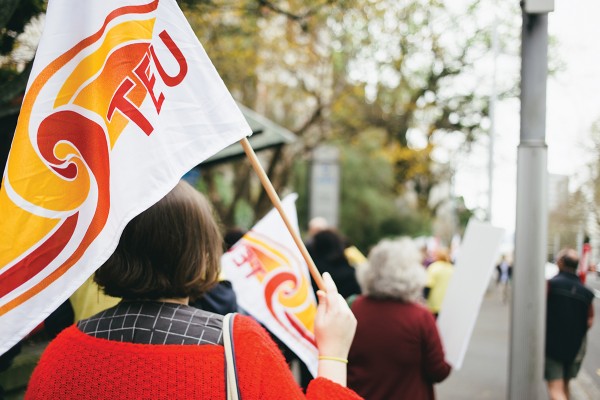A nationwide strike of Tertiary Education Union (TEU) members, including some of your professors, could be on the cards.
On Tuesday 21st, around 150 Uni staff united in the Main Common Room as part of a nationwide TEU “stop work meeting” to vote on a motion to go on strike. The motivation for the strike is to demand an 8% pay rise for staff with collective agreements with all eight of Aotearoa’s Universities. There was near unanimous support for the strike action ballot with zero against and only three abstentions. Union members will vote on Tuesday as to whether a strike action will be taken.
Craig Marshall, president of TEU Otago, told Critic Te Ārohi, “we are looking for a payrise that reflects increases in the cost of living over the past three years in which our pay rises have fallen significantly far behind.” Between 2008 and 2020 operating expenses went up by a whooping 18% while staff costs only increased by 7%. Craig says that the problem was the lack of government investment in tertiary education. “The cake has gotten way too small and we are fighting how it is gonna be divided up,” said Craig.
The vibe of the meeting was electric (insert “unionized” pun here). Before a vote was held on whether to hold a vote to strike, the floor was open for union members to air their discontent and grievances. Professor Brent Lovelock, Head of the Tourism Department, said the “last three years have been pretty tough” due to “oppressive increases in contract hours and workloads [increasing between 30-40%] and budget cuts”. An AskOtago employee spoke up saying they’re “struggling to keep up with what Uni is asking us to do and [we’re] not given [adequate] resources.” Ultimately, Professor Brian Roper, Head of the Politics Department, called for union members to put pressure on the University and government to “take industrial action!”
The lack of government funding has cascading effects for everyone (not just Uni staff). Craig explained that “a lot of staff are leaving because they can get better paid jobs elsewhere,” meanwhile, “the slow loss of people compromises our ability to do all of our jobs.” In the long term, the continued underinvestment in training for the past couple of decades results in a shortage of people adequately trained. “If you don't fund those areas to do their jobs properly you will not have those trained people in the future,” said Craig.
The nature of a strike is designed to inconvenience people. However, Craig assured Critic Te Ārohi that they will discuss their plans with OUSA and aim to “make sure that there are no unintended consequences [to students]”. However, no teaching will necessarily have an effect on people who go to lectures but “may not have much of an effect on those that don’t”, said Craig. Moral of the story, procrastination and laziness for the win.



